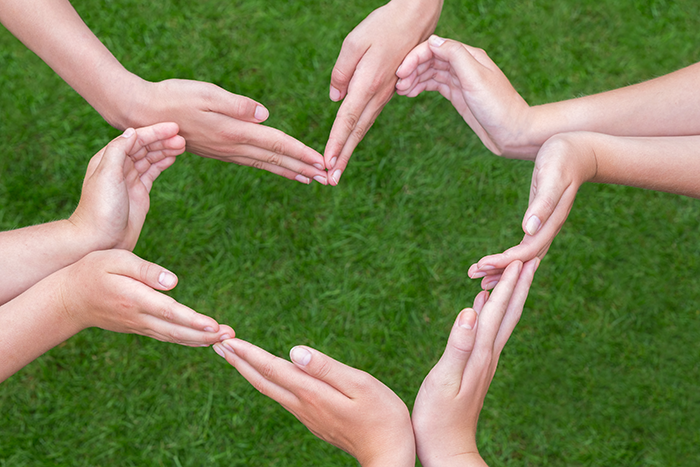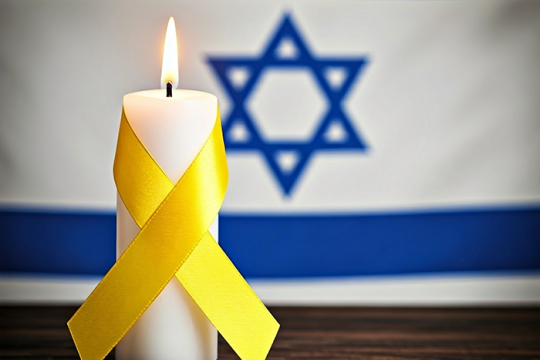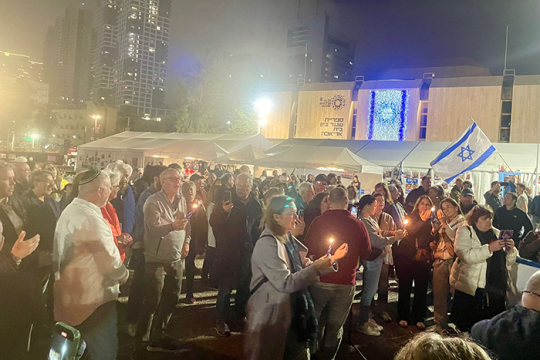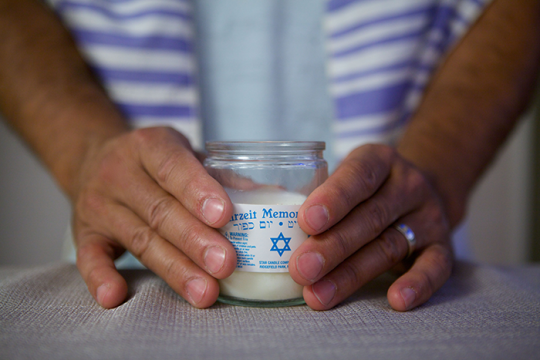
Your heart beats fast. You can feel it thumping in your chest. A wave of heat comes over you. Beads of sweat form on your forehead. Your breath quickens. It feels rapid and shallow. Your arms and legs are tense. The muscles in your shoulder and neck feel tight and strained. This is commonly known as “fight-flight-or-freeze” mode.
Many of us have been in this fight-flight-or-freeze mode for almost two years. It began on the morning of October 7th, 2023, when we awoke to the shocking news that our Jewish family in Israel was being brutally attacked and targeted for violence, death, and destruction while taking hundreds hostage.
Today, more than 700 days after that horrific attack, we still feel the trauma of that October morning. We remain tense and hypervigilant, scanning the environment for another sign of attack.
Ongoing antisemitic violence justifies our fears and continues to traumatize us. Just four months ago, in May, two young people dedicated to peace and reconciliation between Israelis and Palestinians were gunned down in Washington, D.C. as they left a Jewish museum.
In June, 15 people, including an 88-year-old Holocaust survivor, were wounded in Boulder, Colorado when a man with a homemade flamethrower sprayed a crowd gathered to raise awareness of the remaining Israeli hostages. One of the victims later died from their wounds.
What are we to do with this ongoing trauma? How are we to heal our bodies and minds?
I don’t pretend to have all the answers about achieving a lasting peace or addressing antisemitism; I’m no expert in responding to baseless hatred.
I do know something about calming our bodies and minds when we feel threatened. I’ve been studying and practicing mind-body science for over 30 years, drawing on thousands of years of Jewish teachings.
We’re on a journey of collective recovery. May compassion and kindness guide our steps and give us the healing that we need.
Each day, Judaism offers us a path of compassion; tradition teaches that compassion is one of God’s primary attributes. As the Torah says: “The Eternal is a God of compassion (rachum) and grace” (Exodus 34:6).
The Hebrew word rachum is related to the Hebrew word rechem (womb). The womb surrounds a child with warmth, nourishment, and support. In this time of healing from the trauma of antisemitism, we surround ourselves with the warmth and support of our community.
That’s what we need and must give one another: compassion (rachum).
We move from fear to love and compassion, reaching out and connecting with each other in bonds of kindness, love, and caring. We heal our broken and constricted hearts through the innate wholeness and openness of one another. The great Chasidic master Rebbe Menachem Mendl of Kotzk taught, “There is nothing so whole as a broken heart.”
We offer our broken hearts to God and share them with one another. We connect with our trusted neighbors, friends, family members, community members, and allies. We sit or stand together; celebrate and mourn; give and receive; and, of course, eat and drink together. We heal our collective trauma and renew our collective nervous systems with connection, lovingkindness, and compassion.
There is at least one more important path to our recovery: the age-old Jewish spiritual practice of blessing and gratitude, called hakarat hatov. Hakarat hatov literally means “seeing the good.” Judaism guides us to wake up each day in gratitude, appreciating all the good that surrounds us and is within us.
Prominent voices in the Jewish world have rightly lamented that too many of us felt abandoned, alone, and invalidated on October 7th and the days that followed. Many people were silent to our shock-filled suffering: friends; former allies; and local, national, and international leaders. Many of them hardened their hearts to our unfathomable pain.
Yet when we turned toward the good and lifted our tear-soaked eyes, we could perceive the goodness surrounding us. We could see that many people were standing beside us to offer their love, compassion, and kindness.
We saw the brave souls near Nova, like Bedouin minibus driver Youssef Ziadna and Israeli farmer Oz Davidian, who risked their lives and families to save our siblings under brutal attack outside Gaza. We see the courageous security professionals here, in America, who continue to stand watch over us, our families, and Jewish institutions keeping us safe and protected.
God bless them. We see their goodness.
We recognize all the Jewish and Jewish-adjacent organizations around the world, who continue to work tirelessly as they keep our people safe, comfort us, and help us heal.
God bless them. We recognize their loving acts.
We acknowledge all our friends and neighbors who continue to speak to us in sympathy, solidarity, and understanding. Their warmth and succor help us feel safe and soothe our troubled spirits.
God bless them. We see the beauty of their souls and are deeply grateful.
We appreciate how our Jewish community and the thousands of Jewish communities across the planet are a source of love, friendship, and support during these difficult times.
There is still much healing that needs to be done until we can feel safe and truly begin again.
We can begin again when we acknowledge our fear and pain. We will begin again when we open our hearts to compassion, lovingkindness, appreciation, and the good will of those who are standing right beside us, whether they be near or far, Jewish or not, human or Divine.
Just remember: the words “scared” and “sacred” are composed of the same letters; the difference lies in how we arrange those letters in our minds, bodies, and spirits.
Watch Rabbi Schechter’s companion sermon to this piece on YouTube.
Related Posts

Marking this Moment: Resources for the Release of the Hostages

Two Years Later: Memory and Meaning on October 7th
